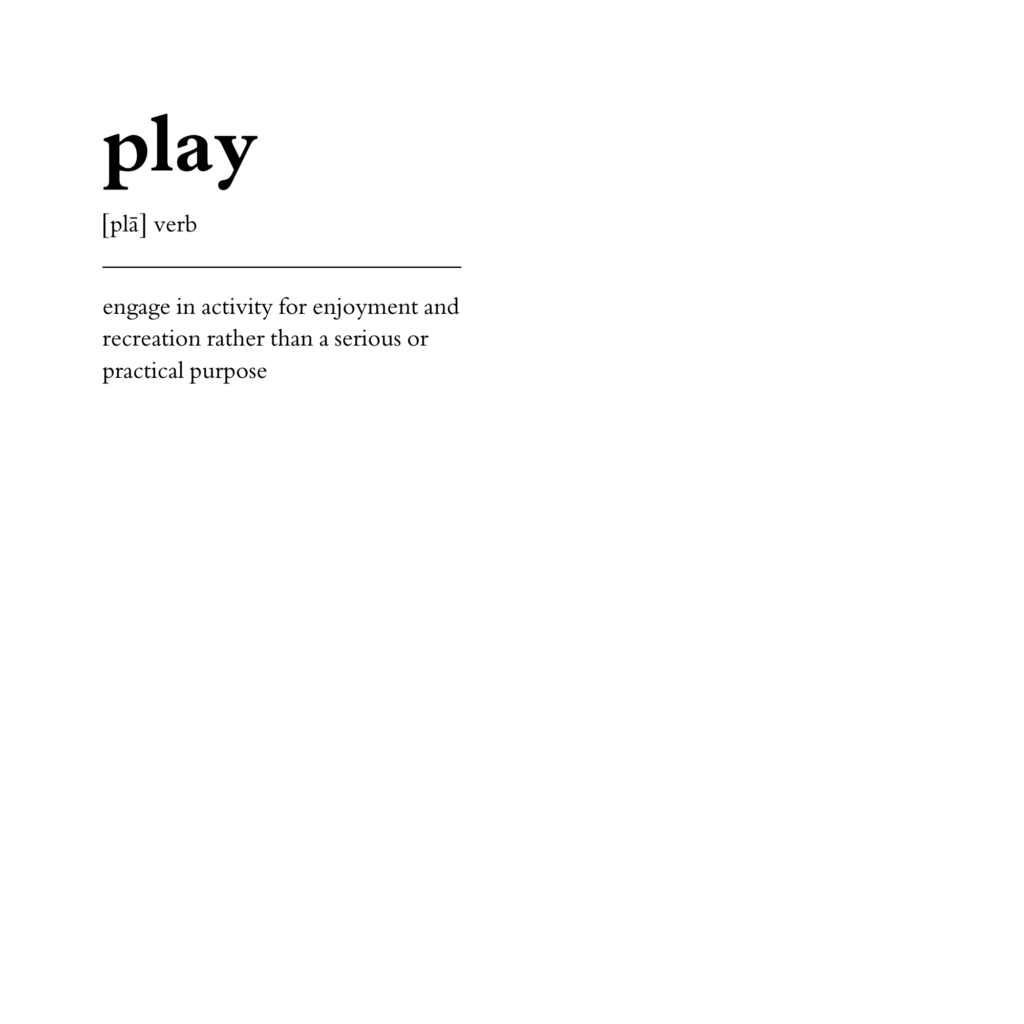
The Power of Play: How Intentional Fun Builds Stronger Families and Teams

From a parent’s use of funny faces to the intricate, architectural practice of Jenga stacking (which- fun fact- can also double as an education in controlled demolition depending on your skill level), “play” is a universal language.
Since birth, humans are programmed to understand, engage, and explore the idea of play. Not only can a light game of tag exercise the imagination, but a child’s regular participation in activities can build social awareness among an abundance of cognitive skills.
While the textbook definition of the word “play” categorizes the verb as an action used for fun rather than a practical purpose, a professional father’s efforts to squeeze activities into an already busy schedule serves a much more impactful purpose than Google Dictionary might be accounting for.
Involved play turns that “rather than” into a “for.”
PLAY: THE CONCEPT
Play Takes Form
Any house with a four-legged family member knows that humans are not the only species to take part in playtime. Puppies gentle-fight to build survival skills, bees participate in soccer (well, perhaps they aren’t aware of their FIFA-level expertise, but recent studies show an interest in similar behavior), and humans conduct countless rounds of hide-and-seek for the sole purpose of entertainment.
Veterinarian and researcher Stuart Brown discusses this phenomenon in his TED Talk surrounding the benefits of amusement activities. Outlining the experience of German photographer Norbert Rosing who happened to be photographing a tethered husky in Manitoba, Brown’s talk describes a unique situation in which “play” served as interference in a life or death situation. As a polar bear made its way on the scene with a hungry look, the husky pup knew there was no way out of the situation.

So what did she do? She played.
With that tail-wagging, paw-hopping tactic that dogs use in a classic horse-around, this female husky managed to stop a meal-searching, male polar bear in its tracks. Play is powerful.
From in-office tension to those every-now-and-then WWE matches between siblings at home, each day faces its own “polar bear.” Finding ways to incorporate light-hearted moments even in spurts of conflict helps diffuse a situation before causing drastic damage. From releasing pent-up energy in the house by hosting an impromptu, 10-minute dance party to crafting a conference escape room during a high-tension quarter for your team, play paves a way for vulnerability and morale. When this mindset is adopted, once-overwhelming environments start to take a more positive shift.
A Dad’s Role
When imagination is nurtured and encouraged to grow in a home setting, a child’s communication, stress management, and ability to empathize with others improves. When this time is enhanced by a dad’s involvement, it provides a unique opportunity for bonding and a greater sense of understanding between parent and child.
Any person who has spent some time in Barbie Land- located anywhere between the couch and playroom- knows that logic and general community planning are light suggestions. This type of play is unstructured- storylines seem to develop on a whim and can face a full 180 twist just as quickly. With no set rules to follow or strict script to reference, play is up to the child.
Unstructured activities like those seen in the expansive country- maybe town, general acreage?- of Barbie Land can be crucial to developing and exercising imagination. When you mix in a parent’s interest in their child’s created world, it communicates a sense of being valued and loved. While young kids might not be able to comprehend the scope of adult responsibilities, they can certainly sense higher levels of stress and piece together the idea that a parent maintains a busy schedule.
When that same parent takes a portion of their post-office day to dive into their child’s creativity, it allows someone like a professional father to model positive behaviors, such as problem-solving, empathy, and cooperation, in showing their genuine interest.
The best part? It doesn’t have to break the bank or the calendar.
PLAY: THE TACTICS
Ways to Play
Intentional play doesn’t require extravagant plans and extensive materials. Memory-making fun can look as small as a spontaneous skip down a sidewalk while on a walk or playing catch in the backyard. From designated board-game nights to elaborate, made-up bedtime stories, check out how to realistically carve out time for intended play in your day-to-day below:
Time It: A busy schedule is no easy feat and can often feel overwhelming when it comes time to participate in at-home adventures. Whip out a timer!
Communicate to your kids that you want to participate in their games, but can only play along for a certain amount of time that night due to a busy to-do list. This ensures that you are maintaining your schedule in a practical way, while also keeping kids in the loop as to why you might have to butt-out of playtime after a certain point.
Jungle Gym: Designate “playground time” where anything in the house goes as far as play. Communicate certain boundaries to not cross (ie. no sharp tools, preferably no hiding the car keys) and let the kids come up with the rules of the game.
Tech-Free Time: Of course, tech-free time has tons of benefits for the development of social skills and imagination. But it’s no fun when the parents get to use theirs!
Participate in tech-free time during play. Give the game your full attention, and in turn, you will naturally communicate the value you hold in your children’s time.
Play Along: While it seems obvious that playing-along might be a requirement of scheduled game time, child-designed games often have plot holes, made-up rules, and no set goal in mind. So buy into it!
By actively showing your interest in this imaginative world, critical thinking, collaboration, and a potential future in party game design will be encouraged. Ask questions and offer your own suggestions along the way.
Professional Play
Frequent play is crucial to the development of a child’s cognitive skills, but it can also be used to create a more welcoming, empathetic, and comfortable work environment. From an increased collaborative atmosphere to a heightened sense of morale and involvement between colleagues, small moments of play throughout the day can make a world of difference.
Play Reminders: Whether you pack a constructed lego figure from home to keep in view on your desk or you schedule a set time to tackle the daily Wordle, displaying reminders of amusement in your schedule or sightline helps maintain a sense of imagination.
Team Activity: Energy in an office setting is a crucial component to maintaining a motivated and collaborative team. When tensions feel high and energy in the office starts to dwindle, schedule a brief team meeting for play. Whether you conduct a team snowball fight using printer paper and office chair barricades or you host a group trivia competition, play inherently fosters small moments of togetherness that revitalize a community.
Meeting-on-the-Go: Sometimes, play is as small as incorporating light movement into your day. Try out a walking meeting. Take your team on a stroll while you discuss the tasks for the week or take a lap around the building while you bounce ideas off of a colleague.
Ways to be Involved
We want to hear from you! Leave us a comment on LinkedIn and share how playtime rolls in your household. Is there a dad-made game that has achieved legendary status or have you found a way to incorporate play into office life? Tell us over on LinkedIn.
Coming Up: Looking for ways to connect with other professional fathers with similar goals? Join us for our first Dynamic Dad Workshop.
What: Breaking Free from Decision Fatigue: A Virtual Workshop for Dads to Reclaim Their Energy at Work and Home
When: January 27th @ 12 p.m.
Where: Zoom
How: Sign up here!

